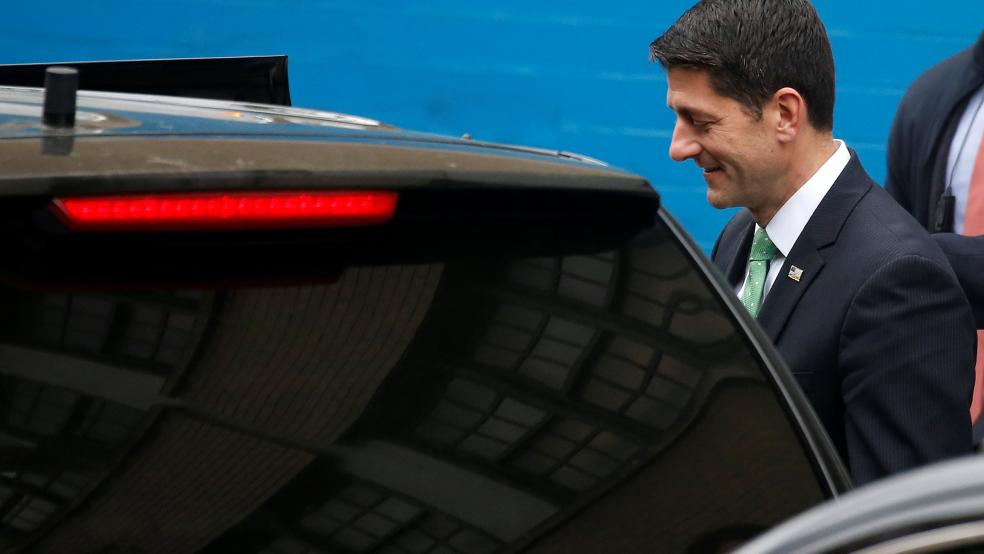Newly ensconced House Speaker Paul D. Ryan (R-WI) signaled over the weekend that he may be a short-timer as the top leader in Congress.
Asked during an interview with Scott Pelley of CBS’s 60 Minutes program how long he imagines being speaker, Ryan replied: “Fourteen months for now is what I know – for the rest of this term.” While many assume he will be sticking around for a lot longer than that, Ryan clearly is a man in a hurry with a big policy agenda to promote while he still holds the gavel.
Related: Paul Ryan Rejects Trump’s Plan to Deport 12 Million Illegal Immigrants
The former chair of both the Budget and Ways and Means committees has strong views on tax and entitlement reform, and at one point had hoped to draft a major overhaul of the federal tax code by last August. Although those plans fell through he is now vowing to pass major tax reform in 2016, ahead of the November presidential and congressional elections. He says he wants to clearly differentiate GOP fiscal policy from that of the Democrats.
"We believe we ought to show what we would do differently in specifics and lay that out to the country so we can have that kind of affirming election,” Ryan said Tuesday evening during a wide ranging policy discussion before The Wall Street Journal’s CEO Council annual meeting.
Ryan previously highlighted some of the key elements of his tax ideas, including consolidating the seven income tax brackets to just two with reduced rates of just 10 percent and 25 percent. The Wisconsin Republican also wants to provide substantial tax relief to small businesses and tap into the hundreds of billions of dollars of untaxed corporate revenue currently being sheltered oversees.
But President Obama and Senate Democrats are unlikely to sign off on any major changes to the tax code before the election, a political reality that Ryan acknowledge last night, according to The Washington Examiner. Yet even if his proposals have no chance of enactment before a new president and a new Congress take office, Ryan says it’s important to provide voters with a clear alternative to Democratic fiscal policy.
Related: Paul Ryan Flexes His Conservative Muscles in Contrast to Boehner
“What matters is that we put out there a specific agenda and ideas for how we would do things,” Ryan said, adding that “We don’t want a personality contest, we want a mandate election.”
He told The Wall Street Journal gathering last night that he would be open to working with Democrats on smaller reforms net year, including international tax provisions that would halt the trend of corporations moving their headquarters out of the U.S. But clearly the new speaker and chief GOP idea man has a more ambitious vision of what must be done.
“I’d simplify the code dramatically,” Ryan told Pelley during the 60 Minutes interview. “I would collapse the rates down to two or three. And I would change the way we tax ourselves internationally, so businesses can take their money and bring it back home so American businesses stay American businesses. And we have to drop our rates on our businesses. I think those three things right there are what I would do.”
Related: Paul Ryan: New House Speaker, Same Old GOP Favors for Wall Street
While Ryan deserves some credit for his earnestness and drive in seeking reforms of the complex federal code, the political hazards of such a move during a high-stakes election year can’t be overstated.
Consolidating and lowering personal and business tax rates necessitates the corresponding elimination of specific tax deductions, loopholes and credits that enjoy widespread support from many business groups and special interests. Upsetting hundreds of interest groups in an election year over a bill that has no chance of being enacted doesn’t make a lot of sense – unless, of course, Ryan and other House GOP leaders intend to keep the loophole-closing provisions secret.
What’s more, Ryan – the GOP’s 2012 vice presidential nominee -- may be presumptuous in attempting to speak for the Republicans on tax reform in an election year. Many of the GOP presidential candidates – including Donald Trump, Ben Carson, Sen. Marco Rubio of Florida, Sen. Rand Paul of Kentucky and former Florida governor Jeb Bush – have unveiled tax reform proposals of their own that differ from Ryan’s comprehensive plan.
Related: House Freedom Caucus Prepares to Challenge Ryan on 2016 Agenda
But there may be a virtue to his move in trying to keep peace among House Republicans as the 2016 campaign heats up. The 40 or so far-right conservatives who make up the Freedom Caucus reportedly will be promoting a new version of the Republican “Contract With America” that includes specific tax credits and other changes in the tax code.
By launching a preemptive strike on tax policy early next year, Ryan may find a way to accommodate the Freedom Caucus’s idea while promoting the full range of Ryan’s long-desired reforms.





